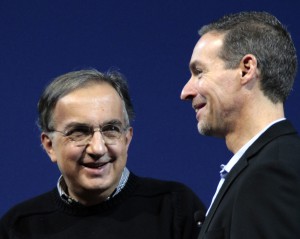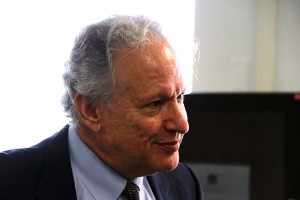
One of the changes made to improve safety is that FCA's safety chief Scott Kunselman, right, now reports directly to CEO Sergio Marchionne.
Hit with the largest package of fines and penalties ever levied by the National Highway Traffic Safety Administration, Fiat Chrysler Automobiles is under the microscope as federal regulators press it to change what has been described as a malfunctioning safety program.
Among other things, the maker will have to buy back perhaps several hundred thousand vehicles, and its safety program will be monitored by an independent outsider. But “that’s not something we fear,” insists the executive who has been appointed within FCA to get its safety efforts back on track.
“We’re focused now on getting fixes into the customer’s hands as quickly as possible,” and making sure that there are no delays when future safety problems are uncovered, said Scott Kunselman, the senior vice president of vehicle safety and regulatory compliance at the trans-Atlantic automaker.
The auto industry, as a whole, has been placed under the microscope during the last year with regulators, lawmakers and consumers alike demanding answers after a series of major safety lapses that included a defective General Motors ignition switch now linked to over 120 deaths, and faulty Takata airbags that have triggered the recall of more than 40 million vehicles worldwide.

NHTSA Administrator Mark Rosekind said Fiat Chrysler is making improvements when it comes to safety.
Fiat Chrysler, meanwhile, faced what NHTSA Administrator Mark Rosekind last week described as an “unprecedented” hearing looking at the handling of 23 separate recalls. Some were delayed long beyond what federal law mandates. In others, the maker was accused of taking a lax approach to ensuring vehicles actually were repaired. Barely 20% of the Jeeps covered by a 2013 service action due to concerns about fires in rear-end crashes have so far been fixed.
On Sunday, NHTSA announced it had reached a consent order that will see FCA pay $105 million and take other steps to speed up repairs, including vehicle buybacks.
But a few days before that announcement, Rosekind appeared to lay out an olive branch, noting that Fiat Chrysler CEO Sergio Marchionne was taking the right sort of steps to transform his company’s safety culture. Such a move “would allow Chrysler and NHTSA to work closely,” Rosekind said.
That’s certainly the automaker’s goal, said Kunselman, during his first interview following the announcement of the consent order.
The automotive veteran was appointed to his post nearly 11 months ago, but he was more than just the latest in line. The safety post itself was elevated substantially. His predecessors had to go through three layers of management to get anything done at the highest level. Kunselman now reports directly to Marchionne.
(Fiat Chrysler hit with record $105 million fine as part of consent order. For more, Click Here.)
That alone won’t fix the problem, Kunselman acknowledged. FCA needs to rethink its entire approach to safety. Among other things, he added, “executional details were a challenge for us.” Not only did FCA miss some problems, critics contend, but also it didn’t act with all necessary haste once a safety problem was uncovered.
Kunselman said FCA is studying the steps rival GM has taken since its own safety problems began coming to light in early 2014. It remains to be seen if that will mean a flood of new recalls in the months ahead. But Clarence Ditlow, the director of the Center for Automotive Safety, suggested that, like GM, “If they (FCA) really want to do the right thing they have a lot of skeletons in closet they have to deal with.”
The normally critical Ditlow, nonetheless, said he was cautiously optimistic “Chrysler has changed.”
One of the steps Kunselman believes FCA needs to take is to increase “transparency.” It must be far more open, both internally and externally, about its safety problems. Among other things, it will have to keep in closer touch by more readily sharing data with NHTSA.
(Click Here for more details about 1.4 million Jeeps recalled to fix hacking problem.)
But another step will be finding ways to get more recalled vehicles fixed – and as quickly as possible. That can be a major challenge, he cautioned, when dealing with older vehicles. Some of the Jeeps covered by the fire recall are now more than 20 years old. Replacement parts are, in many cases, long out of production. And, in other instances, all new parts must be designed and produced.
In the past, that was a slow, step-by-step process that required figuring out the problem, designing the part, engineering it, then tooling and building the pieces.
Under Kunselman, FCA is taking a new approach, he explained. “While we’re testing something we’re already running the tooling. It’s all about time enhancement…which will make a clear improvement in time to market.”
During an interview in Detroit last week, NHTSA’s Rosekind warned that the agency could yet go back and hold hearings on more FCA recalls. And the $105 million fine includes penalties that will be paid if the automaker doesn’t get things right going forward.
That’s not going to happen, said Kunselman, insisting he and Rosekind are now “on the same page.”
(Chrysler will buy back – then resell – thousands of problematic vehicles. Click Here for more.)
After getting harshly criticized for its past safety efforts, the automaker is winning cautious praise for the moves it is now making. But it will have to prove those steps will actually result in concrete change.

Since the mid 60s when I began taking an interest in cars Chrysler / Dodge dealers have had a reputation for less than quality or mediocre repairs. Something needs to be done from the top to the bottom.